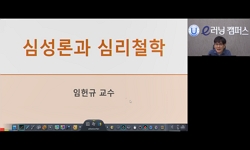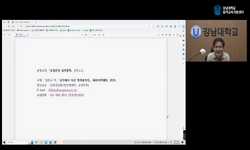退溪의 聖學은 마음과 대화하며 사물의 이치를 知覺[깨달음]하는 마음공부이다. 마음의 구조는 虛靈하며, 그 기능은 대상의 이치를 知覺하는 것이다. 마음이 이치를 탐구하여 통달하고 그것...
http://chineseinput.net/에서 pinyin(병음)방식으로 중국어를 변환할 수 있습니다.
변환된 중국어를 복사하여 사용하시면 됩니다.
- 中文 을 입력하시려면 zhongwen을 입력하시고 space를누르시면됩니다.
- 北京 을 입력하시려면 beijing을 입력하시고 space를 누르시면 됩니다.
https://www.riss.kr/link?id=A107185426
- 저자
- 발행기관
- 학술지명
- 권호사항
-
발행연도
2020
-
작성언어
-
-
주제어
退溪 ; 心學 ; 「天淵翫月」 ; 虛靈 ; 知覺 ; 眞樂 ; 道理 ; 德行 ; 價値合理化 ; 談論 ; Toegye ; Cheonyeonwanwol ; theory of mind ; structure of mind ; perception ; delightful ; behavioral ethics ; value rationality ; discourse
-
등재정보
KCI등재
-
자료형태
학술저널
- 발행기관 URL
-
수록면
7-32(26쪽)
- DOI식별코드
- 제공처
- 소장기관
-
0
상세조회 -
0
다운로드
부가정보
국문 초록 (Abstract)
退溪의 聖學은 마음과 대화하며 사물의 이치를 知覺[깨달음]하는 마음공부이다. 마음의 구조는 虛靈하며, 그 기능은 대상의 이치를 知覺하는 것이다. 마음이 이치를 탐구하여 통달하고 그것을 익혀서 실천하는 사람은 무엇을 하든 어디로 가든 걸림이 없는 자유인이 된다. 따라서 마음공부의 목적은 자아의 맑고 깨끗한 本性을 발견하고 修養함으로써 自由自在한 聖人의 경지에 이르는 것이다.
退溪의 詩는 자연과 대화하며 山水가 마음에 저절로 준 즐거움을 말하지 않을 수 없어서 쓴 문학이다. 이때의 즐거움은 억지로 구하여 얻은 것이 아니다. 왜냐하면 억지로 구한 즐거움은 마음의 집착이 되므로 無欲의 청정한 마음에서 일어난 즐거움이 될 수 없기 때문이다. 청정한 마음의 自由自在한 즐거움이 참된 즐거움[眞樂]이며, 이는 말로써 형언할 수 없으나 말하지 않으면 즐거움을 전할 수가 없으므로 비유의 형식인 詩로 지은 것이다.
退溪의 生活은 사람과 대화하며 道理를 지키는 德行의 실천이다. 그는 자기를 버리고 남을 따르지 못하는 것이 큰 病이라고 제자들에게 가르쳤고, 제자들은 退溪에게서 이것이니 저것이니 구분하는 境界가 없었다고 전한다. 구분은 공동체가 분열하는 원인이 된다. 남을 따르지 못하는 病은 구성원이 대립하는 원인이다. 따라서 퇴계의 생활은 분열하고 대립하는 현실에서 사회적 統合과 구성원의 和樂을 가르치고 실천한 의미가 있다.
이치에 통달하는 마음공부, 이치가 마음에 준 즐거움을 표현한 문학, 도리를 지키고 덕행을 실천한 생활은, 공동체의 화합과 즐거움을 지향한 인간의 本性的 價値를 合理化한 談論이다. 이러한 退溪의 談論은 인욕에 집착함으로써 인간성을 상실한 시대에 自我를 完成하고 他人과 調和를 이루며 살아가는 道理와 德行을 과거에도 안내해 왔으며 현재와 미래에도 안내할 것이다.
이 연구의 목적은 退溪의 心學에 근거하여 그의 詩 가운데 幽人이 등장하는 「天淵翫月」에 표현한 즐거움의 본질을 분석함으로써 공동체의 和合을 지향한 談論을 도출하는 데 있다.
다국어 초록 (Multilingual Abstract)
This article draws a discourse of value rationality to pursue a cohesive community by reviewing Teogye’s poem, titled 天淵翫月(Cheonyeonwanwol) and analyzing it based on his theory of mind. In his poem, a metaphor is used to compare the clear mo...
This article draws a discourse of value rationality to pursue a cohesive community by reviewing Teogye’s poem, titled 天淵翫月(Cheonyeonwanwol) and analyzing it based on his theory of mind.
In his poem, a metaphor is used to compare the clear moon symbolizing Toegye’s theory of mind and the moon blocked by the cloud describing any personal avarice such as obsession and greed. The theory of mind is based on two concepts: a structure of innocent mind and perception regarding how people perceive this structure as a matter of principle. These two essential concepts contribute to establishing the behavioral ethics of studying a structure of mind and perceiving a principle. The behavioral ethics suggested by Toegye should be continuously exercised to prevent any personal avarice from differentiating between the two ideological hegemony. Then the innocent mind can be upheld by these efforts. Like the clear moon shining on the land, people following these behavioral ethics can enjoy an essential pleasure without worrying about personal avarice and ideological conflicts.
Toegye’s life and pursuit of purpose can be inferred in his poem. Toegye, in his life, actually pursued his behavioral ethics, studying a structure of mind and perceiving a matter of principle by communicating with members of his community. He also had efforts to keep a lookout for personal avarice and to avoid differentiating between ideological conflicts. The poem, titled 天淵翫月 (Cheonyeonwanwol), reflecting an essential pleasure caused by his exercising behavioral ethics, implies how the transitional stage to transforming mechanized and digitalized society overcomes ideological conflicts and establishes a cohesive community.
동일학술지(권/호) 다른 논문
-
- 사단법인 퇴계학부산연구원
- 안유경 ( An¸ Yoo-kyoung )
- 2020
- KCI등재
-
- 사단법인 퇴계학부산연구원
- 佐藤弘夫 ( Sato-hiroo )
- 2020
- KCI등재
-
석곡(石谷) 이규준(李圭晙)의 인심도심설(人心道心說) 이해
- 사단법인 퇴계학부산연구원
- 成昊俊 ( Sung¸ Ho-jun )
- 2020
- KCI등재
-
하빈(河濱) 신후담(愼後聃)의 이성이기론(二性二氣論)과 그 비판
- 사단법인 퇴계학부산연구원
- 이상익 ( Lee¸ Sang-ik )
- 2020
- KCI등재





 KCI
KCI KISS
KISS







